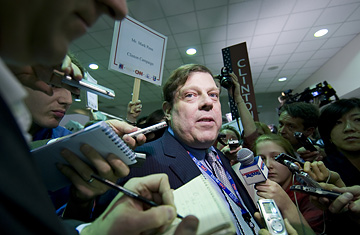
Clinton campaign advisor Mark Penn speaks to reporters following the Democratic debate at the University of Texas at Austin, February 21, 2008.
(3 of 3)
Just exactly how much difference the reduction in Penn's formal role will make remains to be seen. "These things are subtle, and I think it's way too early to tell," says one top adviser to the Clinton campaign. "Finding a new role for him and a lesser role will take time." But time is what Clinton is lacking now, and the early indications are that Penn remains entrenched. The campaign announced Sunday that his duties as chief strategist will now be carried out by communications director Howard Wolfson and pollster Geoff Garin, who joined the campaign a few weeks ago. But the morning after his demotion, Penn participated in a morning conference call of the campaign's inner circle, and he was involved in debate preparation that afternoon.
The Obama campaign was quick to pounce. "Even though Senator Clinton said she'd distance herself from her chief strategist for meeting with the Colombian government, we later found out that he's still very much part of her strategy team," Obama spokesman Hari Sevugan said. And there are some on Clinton's own team who say that Penn's continued presence there is not a good idea. Pennsylvania Gov. Ed Rendell, her most high-profile supporter in the state, told USA Today that Penn "was just dead wrong" when he accepted the Colombian government business. Asked whether Clinton should sever her ties with Penn completely, Rendell replied: "Oh, I would."
The original version of this article noted that in 2000 "Al Gore drew fire when it was revealed that a key aide, Carter Eskew, had done work on a tobacco industry advertising campaign that was aimed at undermining the Clinton Administration's tobacco settlement deal." In fact, Eskew had done the work before he joined the campaign, at which time Gore insisted he leave his firm.
